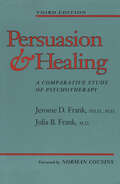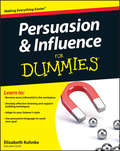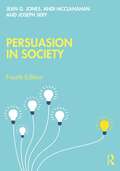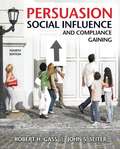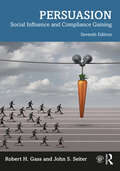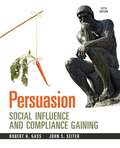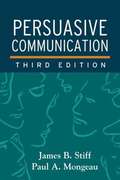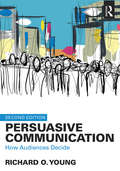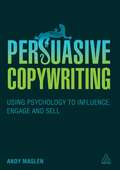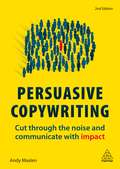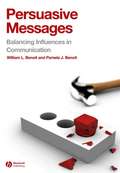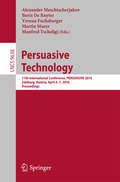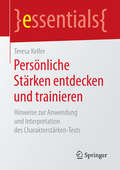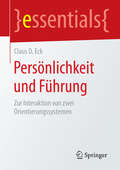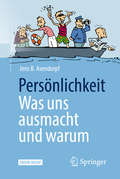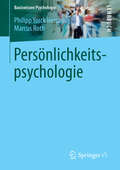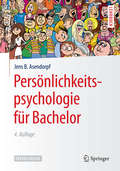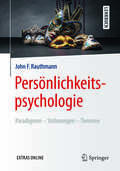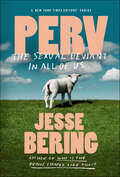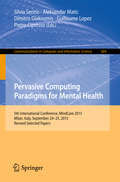- Table View
- List View
Persuasion and Healing: A Comparative Study of Psychotherapy
by Jerome D. Frank Julia B. FrankThis popular study of "psychological healing"treats topics ranging from religious revivalism and magical healing to contemporary psychotherapies, from the role of the shaman in nonindustrialized societies to the traditional mental hospital. Jerome and Julia Frank (who are father and daughter) contend that these therapies share common elements that improve the "morale"of sufferers. And in combating the "demoralizing meaning"that people attach to their experiences, the authors argue, many therapies are surprisingly similar to rhetoric (the art of persuasion) and to hermeneutics (the study of meanings).Highly acclaimed in previous editions, Persuasion and Healing has been completely revised and expanded. In addition to a broadened exploration of the role of demoralization in illness, this latest edition offers updated information on topics including self-help, family therapy, psychopharmacology, psychotherapy for the mentally ill, and techniques such as primal therapy and bioenergetics. As they explore the power of "healing rhetoric"in these activities, the authors strengthen the ties among the various healing profession.
Persuasion and Influence For Dummies
by Elizabeth KuhnkeMany people want to gain trust or support in business and throughout life, but the true skill is doing so in a charming fashion! Whether you're convincing the boss about your much-deserved promotion or a busy restaurateur to offer a better table, the power of persuasion can help improve and increase your successes.Elizabeth Kuhnke, author of the bestselling Body Language For Dummies, guides the reader through easy-to-implement techniques that can turn a timid person into someone bursting with self confidence and the ability to influence.Topics covered will include:The key elements in becoming more persuasive - body language, listening skills, using persuasive words and actions Finding a common ground and establishing a connection with your audience Capturing their attention and keeping them interested Putting yourself across convincingly Getting things done through others Identifying the type of person you're dealing with - and responding in an appropriate manner
Persuasion in Society
by Jean G. Jones Andi McClanahan Joseph SeryThis fully-updated fourth edition introduces readers to the rich tapestry of persuasive technique and scholarship, interweaving perspectives from rhetoric, critical theory, and social science and applying their insights to practical political, social, and business contexts. This text examines current and classical theory through the lens of contemporary culture, encouraging readers to explore the nature of persuasion and to understand its impact in their lives. Employing a contemporary approach, it draws from popular culture, mass media, social media, advertising, political campaigns, and social movements to help readers become informed creators and consumers of persuasive messages. Case studies show how and why people fall for persuasive messages, demonstrating how persuasion works at a cognitive level. This new edition includes extended treatment of the ethics of persuasion, including opposing views on handling controversial issues in the college classroom; a new chapter on propaganda and ideology; and a greater focus on digital contexts and social media. Discussion questions, exercises, and key terms are provided for each chapter. This textbook will be a valuable tool for students of communication, media studies, politics, psychology, and business and advertising. Online resources for instructors include PowerPoint slides and test bank.
Persuasion, Social Influence, and Compliance Gaining (4th edition)
by Robert H. Gass John S. SeiterThis text looks at persuasion from a broad-based perspective, encompassing the scope of persuasion found in everyday life. By examining persuasion in contexts such as advertising, small groups, and face-to-face encounters, the text places emphasis on new avenues of studying persuasion, such as deception and deception detection, compliance gaining, and music as persuasion. This second edition contains a new chapter on visual persuasion, expanded discussions of propaganda and cultural influences on persuasion, and a new section on adapting to audiences. Gass is affiliated with California State University. Seiter is affiliated with Utah State University. Annotation c. Book News, Inc. , Portland, OR (booknews. com)
Persuasion: Social Influence and Compliance Gaining
by John S Seiter Robert H GassThe seventh edition of this field-leading textbook provides an accessible and rigorous presentation of major theories of persuasion and their applications to a variety of real-world contexts. In addition to presenting established theories and models, this text encourages students to develop and apply general conclusions about persuasion in real-world settings. Along the way, students are introduced to the practice of social influence in an array of contexts (e.g., advertising, marketing, politics, interpersonal relationships, social media, groups) and across a variety of topics (e.g., credibility, personality, deception, motivational appeals, visual persuasion). The new edition features expanded treatment of digital and social media; up-to-date research on theory and practice; an increased number of international cases; and new and expanded discussions of topics such as online influencers, disinformation and 'fake news,' deepfakes, message framing, normative influence, stigmatized language, and inoculation theory. This is the ideal textbook for courses on persuasion in communication, psychology, advertising, and marketing programs. Instructors can also use the book’s downloadable test bank, instructor’s manual, and PowerPoint slides in preparing course material.
Persuasion: Social Influence and Compliance Gaining
by Robert H. Gass John S. SeiterThe 5th edition explores how social media continues to be a form of influence, but it also looks at grassroots movements, such as the Tea Party and Occupy Wall Street, and traditional forms of persuasion, such as advertising, marketing, and political campaigning.
Persuasive Communication, Third Edition
by Paul A. Mongeau James B. StiffProviding an accessible integration of theory and research methods, this text prepares students to critically analyze persuasive appeals and to design effective messages and campaigns. The book draws on key ideas from both communication and social psychology to explore the mutual influence of cognitive and affective processes and the characteristics and production of messages. It gives the reader a solid grasp of foundational issues in persuasion research, the core components of persuasive transactions, and major theoretical models. Instructive concrete examples illustrate applications of the concepts in such settings as health promotion, political campaigns, the courtroom, and advertising. New to This Edition *Engaging topic boxes on college drinking, attitudes about same-sex marriage, the "birther" movement, and other timely issues. *New or expanded discussions of the integrative model of behavioral prediction, the use of guilt appeals, social media, individualized tailoring of political messages, and numerous other topics. *The latest data and theoretical perspectives. *Epilogue on current and future trends in the field.
Persuasive Communication: How Audiences Decide
by Richard O. YoungThis updated and expanded edition of Persuasive Communication offers a comprehensive introduction to persuasion and real-world decision making. Drawing on empirical research from social psychology, neuroscience, business communication research, cognitive science, and behavioral economics, Young reveals the thought processes of many different audiences—from investors to CEOs—to help students better understand why audiences make the decisions they make and how to influence them. The book covers a broad range of communication techniques, richly illustrated with compelling examples, including resumes, speeches, and slide presentations, to help students recognize persuasive methods that do, and do not, work. A detailed analysis of the emotions and biases that go into decision making arms students with perceptive insights into human behavior and helps them apply this understanding with various decision-making aids. Students will learn how to impact potential employers, clients, and other audiences essential to their success. This book will prove fascinating to many, and especially useful for students of persuasion, rhetoric, and business communication.
Persuasive Copywriting
by Andy Maslen"We ordered coffee, cut open a human brain and discovered the secret of persuasive copywriting." A chance encounter with a neuroscientist showed Andy Maslen that his belief in the power of emotion was founded on hard science. Over coffee, the two discussed brain anatomy and the reason-defying power of human emotions.Andy's subsequent research led him to realise that how people think and feel haven't changed since the time of cavemen. We make decisions on emotional grounds and rationalise them later.Persuasive Copywriting takes you deep inside customers' brains. You'll learn the relationship between selling and storytelling. And the market-tested techniques that get people to engage with, and be persuaded by, your copy. Use it to modify people's behaviour by tapping into their deepest psychological drives. Gain copywriting confidenceThis course-in-a-book explains the neuroscience behind our appetite for stories. It demystifies advanced copywriting skills with examples, exercises and tips. And it helps you hone your skills with easy-to-use tools included in the book, and online... 13 real-world case studies 25 psychological copywriting techniques 75 practical exercises 125 words and phrases that trigger emotions 125-question copywriting quizAll help you improve your copywriting skills and perfect the emotion-driven sale.Who should buy Persuasive Copywriting? Junior copywriters can use it to catch up with their more experienced peers. Senior copywriters can use it to stay ahead of the game. Now you can employ this powerful psychological approach.This enjoyable book helps you find the right tone of voice, avoid common copywriting traps and tap into customers' deepest drives. You'll find yourself writing enjoyable, compelling copy that stands out in today's cluttered marketplace.Andy has achieved amazing results for his clients by focusing on stories and their deep connection to customers' needs and wants. With this book by your side, you can too.
Persuasive Copywriting: Cut Through the Noise and Communicate With Impact
by Andy MaslenPersuasive Copywriting, second edition, is the ultimate copywriting survival guide for the 21st century. With the majority of creative professionals developing their skills on the job, it is notoriously difficult to benchmark successful copy. This book provides a step up for those who already know the basics, and are seeking more advanced, psychology-driven techniques to gain the competitive edge. With practical insight into human decision making and consumer engagement, it inspires the clear-cut confidence needed to create, quantify and sell stand out copy in a cluttered marketplace. This second edition of Persuasive Copywriting complements the "how to" perspective of copywriting, with impressive interviews from leading ad agencies and copywriters across the globe, addressing day to day issues faced in a multitude of roles. Updates include practical advice to measure and benchmark effective copy, guidance on creating and critiquing briefs, plus four new chapters on how to weave copywriting skills into the wider industry. These cover particularly useful ground around storytelling, content marketing and the impact of evolving channels like mobile and social media. Practical and inspiring, it is a vibrant, all-encompassing guide to copywriting; an essential to every marketer's bookshelf.
Persuasive Messages: The Process of Influence
by William L. Benoit Pamela J. BenoitWilliam and Pamela Benoit's (both communication, U. of Missouri- Columbia) textbook offers college students practical advice on refining one's purpose, understanding one's audience, and designing a persuasive message. Coverage includes key concepts, sources, and the relationship between attitudes and behavior; the mechanics of creating persuasive messages; theories of persuasion; and the use of persuasion in two particular contexts, advertising and political campaigns.
Persuasive Technology
by Alexander Meschtscherjakov Boris De Ruyter Verena Fuchsberger Martin Murer Manfred TscheligiThis book constitutes therefereed proceedings of the 11th International Conference on PersuasiveTechnology, PERSUASIVE 2016, held in Salzburg, Austria, in April 2016. The 27 revised full papers and 3 revised short papers presented were carefullyreviewed and selected from 73 submissions. The papers are grouped in topicalsections on individual differences, theoretical reflections, prevention andmotivation, methods and models, games and gamification, interventions forbehavior change, and design strategies and techniques.
Persönliche Stärken entdecken und trainieren: Hinweise zur Anwendung und Interpretation des Charakterstärken-Tests (essentials)
by Teresa KellerIn diesem essential stellt Teresa Keller aktuelle Erkenntnisse vor, wie die eigenen Stärken systematisch entdeckt und erforscht werden können. Damit diese auch im Alltag Anwendung finden, präsentiert die Autorin eine Vielzahl konkreter Anregungen und Impulse, wie Stärken bewusst trainiert und weiterentwickelt werden können. Der VIA-Charakterstärkentest, der eine schnelle und wissenschaftlich fundierte Möglichkeit der Stärkenerkennung ermöglicht, steht dabei im Mittelpunkt. Ergänzend werden weitere Methoden zur Entdeckung von Stärken vorgestellt. Eine ausführliche Erläuterung von 24 zentralen Stärken bietet Raum für Selbstreflexion und liefert überraschende Erkenntnisse. Denn das alltägliche Anwenden unserer fünf wichtigsten Stärken führt zu mehr Selbstbewusstsein, macht uns leistungsfähiger und erfolgreicher.
Persönlichkeit und Führung: Zur Interaktion von zwei Orientierungssystemen (essentials)
by Claus D. EckClaus D. Eck beschreibt das Zusammenspiel von zwei hochkomplexen Phänomenen: Führung und Persönlichkeit. Diese beiden Faktoren sind nicht voneinander trennbar und ständig aufeinander bezogen. Denn Führung wird nicht von Strukturen oder Systemen ausgeübt, sondern von Personen, und sie bezieht sich auf Personen. Die Persönlichkeit und die Führung sind im Sinne von Waldenfels "Hyperphänomene". Führen ist mehr als das Schließen der unvermeidlichen Lücken und somit auch mehr als eine Ergänzung der Managementfunktion. Was Führung ausmacht, sind der Wille und die Fähigkeit, auf andere einen maßgebenden Einfluss auszuüben, andere zu befähigen, selbsttätig die gegebenen Herausforderungen zu meistern. Führung ist punktuell, aber entscheidend, sie weiß sich immer auch zurückzunehmen und fördert so die relative Autonomie der Geführten.
Persönlichkeit und Selbststeuerung der Generation Z: Ein Leitfaden für Bildungsträger und die mittelständische Unternehmenspraxis (essentials)
by Karin MeyerDie Generation Z stellt konventionelle Konzepte in Frage. Von Bedeutung für den Erfolg von Unternehmen und Bildungsträgern ist es daher, sie als zukünftige Mitarbeiter und Lernende zu verstehen sowie deren Stärken und Schwächen zu kennen. Dieses essential gibt wesentliche Einblicke in die Persönlichkeit und Selbststeuerung der jungen Generation. Es werden Handlungsempfehlungen im Checklisten-Format abgebildet – mit dem Ziel, Bewährtes zum Wohl aller Beteiligten zu verändern.
Persönlichkeit, Burnout und Work Engagement: Eine Einführung für Psychotherapeuten und Angehörige gefährdeter Berufsgruppen (essentials)
by Philipp Yorck Herzberg Franziska Sisolefsky Madiha RanaBei diesem essential handelt es sich um eine praxisnahe Einführung in die Thematiken Burnout und Work Engagement, die als Gegenpole vor allem von der eigenen Persönlichkeit abhängig sind und in der psychotherapeutischen Praxis eine große Bedeutung aufweisen. Das Autorenteam stellt die wichtigsten Definitionen und klare Symptomchecklisten vor und erläutert den Einfluss der Persönlichkeit auf die Entstehung von Burnout sowie von positivem Work Engagement. In einem Praxiskapitel werden die Auswirkungen der „Big Five“-Persönlichkeitseigenschaften auf Work Engagement und Burnout am Beispiel von Assistenzärzten veranschaulicht.
Persönlichkeit: was uns ausmacht und warum
by Jens B. AsendorpfPersönlichkeit: was uns ausmacht und warum Wie unterscheiden wir uns in der Persönlichkeit, wie entstehen solche Unterschiede, welche Rolle spielen hierbei Gene und Umwelt? Dieses Sachbuch gibt eine fundierte, aktuelle Übersicht über den Stand der psychologischen Forschung zu diesen Fragen. Jens Asendorpf, einer der renommiertesten Persönlichkeitspsychologen unserer Zeit, steckt darin einen weiten Themenbogen ab. Wie äußert sich die Persönlichkeit im Verhalten und in den sozialen Beziehungen, kann man Persönlichkeitsbeurteilungen trauen, was sind die „Big Five“? Lässt sich die Persönlichkeit aus Spuren im Internet erschließen, wie kann man emotionale und soziale Kompetenzen testen? Wie stark ändert sich die Persönlichkeit im Verlauf des Lebens, was sagen Persönlichkeitsunterschiede zwischen Kindern über die späteren Unterschiede im Erwachsenenalter aus? In welchem Maße ist unsere Persönlichkeit durch unsere Gene und unsere nahen Beziehungen bestimmt, und wie stark prägt umgekehrt unsere Persönlichkeit unsere Beziehungen? Können und sollten wir unsere Persönlichkeit ändern? Der Autor schildert nicht nur Ergebnisse der Forschung, sondern auf allgemeinverständliche Art auch die Methoden, auf denen diese Erkenntnisse beruhen. Damit hebt sich dieses Buch von den meisten psychologischen Ratgebern auf dem Markt ab. Es ist anspruchsvoll, erfordert aber keine Fachkenntnisse. Die Verständlichkeit wird durch viele Grafiken, einfache Tabellen und Kästen mit einer prägnanten Beschreibung von Studien und Methoden unterstützt. Für alle, die sich ein Bild von der heutigen psychologischen Forschung und ihren Ergebnissen zum Thema Persönlichkeit machen wollen, ist dieses Buch unentbehrlich.
Persönlichkeitsbildung durch Tanz: Theoretische Herleitung und empirische Analyse des tänzerischen Selbstkonzepts bei Kindern
by Helena RudiAuf persönlichkeitsbildender Ebene werden tänzerischen Aktivitäten eine Vielzahl an positiven Effekten zugeschrieben, insbesondere, wenn sie partizipative oder experimentelle Prinzipien und ästhetisch-kulturelle Bildungsinhalte fokussieren. Mit der Nutzung domainunspezifischer Theorien und Erhebungsverfahren können bisherige Forschungsergebnisse allerdings nur bedingt diskutiert und miteinander verglichen werden. Die Entwicklung tanzspezifischer Modelle und Erhebungsverfahren erweist sich damit als notwedig.Vor diesem Hintergrund zielt die vorliegende Schrift auf die theoretische Herleitung und empirische Überprüfung eines tänzerischen Selbstkonzepts bei Kindern im Alter von acht bis zwölf Jahren ab. Die Autorin entwickelt und überprüft dieses nicht nur mithilfe qualitativer und quantitativer Verfahren im Mixed Methods Design, sie bettet ihr Konzept unter pädagogischer Perspektivierung auch in aktuelle Forschungsdiskurse der ästhetischen und kulturellen Bildung (bspw. Digitalität) sowie der Selbstkonzeptforschung (bspw. soziale Interaktionsprozesse) ein.
Persönlichkeitspsychologie (Basiswissen Psychologie)
by Marcus Roth Philipp Yorck HerzbergWas ist Persönlichkeit? Was macht die Einzigartigkeit jedes Menschen aus? Können wir uns ändern? Dieses Lehrbuch liefert einen kompakten und verständlichen Überblick über das Fach "Persönlichkeitspsychologie und Differentielle Psychologie". Die Fokussierung auf notwendiges Basiswissen steht dabei im Vordergrund und bietet eine erste Orientierung.
Persönlichkeitspsychologie für Bachelor
by Jens B. AsendorpfDieses Lehrbuch erklärt alle wichtigen Themen des psychologischen Grundlagenfachs „Persönlichkeitspsychologie“ kompakt und verständlich. Zahlreiche Fallbeispiele und Praxishinweise stellen dabei den Bezug zum Alltag her, Lernziele, Kontrollfragen und weiterführende Literatur helfen bei der gezielten Prüfungsvorbereitung. Doch das Buch bietet noch viel mehr: Die begleitende Website lehrbuch-psychologie.springer.com enthält kostenlose Lerntools für Studierende sowie Lehrmaterialien für Dozierende zum Download.
Persönlichkeitspsychologie für Bachelor (Springer-Lehrbuch)
by Jens B. AsendorpfDieses Lehrbuch erklärt alle wichtigen Themen des psychologischen Grundlagenfachs „Persönlichkeitspsychologie“ kompakt und verständlich. Zahlreiche Fallbeispiele und Praxishinweise stellen dabei den Bezug zum Alltag her, Lernziele, Kontrollfragen und weiterführende Literatur helfen bei der gezielten Prüfungsvorbereitung. Doch das Buch bietet noch viel mehr: Die begleitende Website www.lehrbuch-psychologie.springer.com enthält kostenlose Lerntools für Studierende, mp3-Hörbeiträge zum Download sowie Lehrmaterialien für Dozierende.
Persönlichkeitspsychologie: Paradigmen – Strömungen – Theorien (Springer-Lehrbuch)
by John F. RauthmannDieses Lehrbuch bietet einen umfassenden, aber dennoch kompakten Überblick über die Vielfalt der Ansätze in der Persönlichkeitspsychologie. Welche Paradigmen, Strömungen und Theorien gibt es in der Persönlichkeitsforschung? Womit beschäftigen sie sich, was zeichnet sie jeweils aus? Wie kann man sie miteinander vergleichen? Sie erhalten durch die Auseinandersetzung mit diesen Fragen eine profunde Einführung in die Persönlichkeitspsychologie. Damit werden Sie sich in dem Fach besser zurechtfinden. Umfassend und kompakt ▬ Alle wichtigen Ansätze der Persönlichkeitspsychologie umfassend in einem Buch zusammengestellt ▬ Veraltete Ansätze: vorwissenschaftlich, psychodynamisch, lerntheoretisch ▬ Klassische Ansätze: humanistisch, kognitiv, dispositional ▬ Moderne Ansätze: biologisch, transaktional Besser lernen ▬ Vorstellung, Erklärung, Rezeption und Kontrastierung der Ansätze anhand einheitlicher Kriterien ▬ Mit vielen didaktischen Elementen, Tabellen und Abbildungen, die wichtige Informationen klar herausstellen und auf einen Blick zusammenfassen, sowie Online Zusatzmaterialien Für Fortgeschrittene ▬ Fortgeschrittene Psychologie-Studierende im Bachelor ▬ Psychologie-Studierende im Master ▬ Studierende anderer Fachrichtungen (z. B. Pädagogik), die Fachkenntnisse in der Psychologie mitbringen und sich für eine wissenschaftliche Auseinandersetzung mit Persönlichkeit und individuellen Unterschieden interessieren
Perv: The Sexual Deviant in All of Us
by Jesse Bering"As a sex writer, Jesse Bering is fearless—and peerless." —Dan Savage <P><P>"You are a sexual deviant. A pervert, through and through." We may not want to admit it, but as the award-winning columnist and psychologist Jesse Bering reveals in Perv, there is a spectrum of perversion along which we all sit. Whether it's voyeurism, exhibitionism, or your run-of-the-mill foot fetish, we all possess a suite of sexual tastes as unique as our fingerprints—and as secret as the rest of the skeletons we've hidden in our closets. <P><P>Combining cutting-edge studies and critiques of landmark research and conclusions drawn by Sigmund Freud, Alfred Kinsey, and the DSM-5, Bering pulls the curtain back on paraphilias, arguing that sexual deviance is commonplace. He explores the countless fetishists of the world, including people who wear a respectable suit during the day and handcuff a willing sexual partner at night. But he also takes us into the lives of "erotic outliers," such as a woman who falls madly in love with the Eiffel Tower; a pair of deeply affectionate identical twins; those with a particular penchant for statues; and others who are enamored of crevices not found on the human body. <P><P>Moving from science to politics, psychology, history, and his own reflections on growing up gay in America, Bering confronts hypocrisy, prejudice, and harm as they relate to sexuality on a global scale. Humanizing so-called deviants while at the same time asking serious questions about the differences between thought and action, he presents us with a challenge: to understand that our best hope of solving some of the most troubling problems of our age hinges entirely on the amoral study of sex. <P><P>As kinky as it is compassionate, illuminating, and engrossing, Perv is an irresistible and deeply personal book. "I can't promise you an orgasm at the end of our adventure," Bering writes, "but I can promise you a better understanding of why you get the ones you do."
Perv: The Sexual Deviant in All of Us
by Jesse Bering"As a sex writer, Jesse Bering is fearless—and peerless." —Dan Savage"You are a sexual deviant. A pervert, through and through." We may not want to admit it, but as the award-winning columnist and psychologist Jesse Bering reveals in Perv, there is a spectrum of perversion along which we all sit. Whether it's voyeurism, exhibitionism, or your run-of-the-mill foot fetish, we all possess a suite of sexual tastes as unique as our fingerprints—and as secret as the rest of the skeletons we've hidden in our closets.Combining cutting-edge studies and critiques of landmark research and conclusions drawn by Sigmund Freud, Alfred Kinsey, and the DSM-5, Bering pulls the curtain back on paraphilias, arguing that sexual deviance is commonplace. He explores the countless fetishists of the world, including people who wear a respectable suit during the day and handcuff a willing sexual partner at night. But he also takes us into the lives of "erotic outliers," such as a woman who falls madly in love with the Eiffel Tower; a pair of deeply affectionate identical twins; those with a particular penchant for statues; and others who are enamored of crevices not found on the human body. Moving from science to politics, psychology, history, and his own reflections on growing up gay in America, Bering confronts hypocrisy, prejudice, and harm as they relate to sexuality on a global scale. Humanizing so-called deviants while at the same time asking serious questions about the differences between thought and action, he presents us with a challenge: to understand that our best hope of solving some of the most troubling problems of our age hinges entirely on the amoral study of sex.As kinky as it is compassionate, illuminating, and engrossing, Perv is an irresistible and deeply personal book. "I can't promise you an orgasm at the end of our adventure," Bering writes, "but I can promise you a better understanding of why you get the ones you do."
Pervasive Computing Paradigms for Mental Health
by Silvia Serino Aleksandar Matic Dimitris Giakoumis Guillaume Lopez Pietro CipressoThis book constitutes the refereed proceedings of the 5th International Conference on Pervasive Computing Paradigms for Mental Health, MindCare 2015, held in Milan, Italy, in September 2015. The 23 full papers and 6 short papers presented were carefully reviewed and selected from 40 submissions. The papers deal with the use of technologies in favor of maintaining and improving mental wellbeing. They focus on building new computing paradigms and on addressing a multitude of challenges in mental healthcare, for example in psychiatric and psychological domains with emphasis on new technologies, such as video and audio technologies and mobile and wearable computing.
